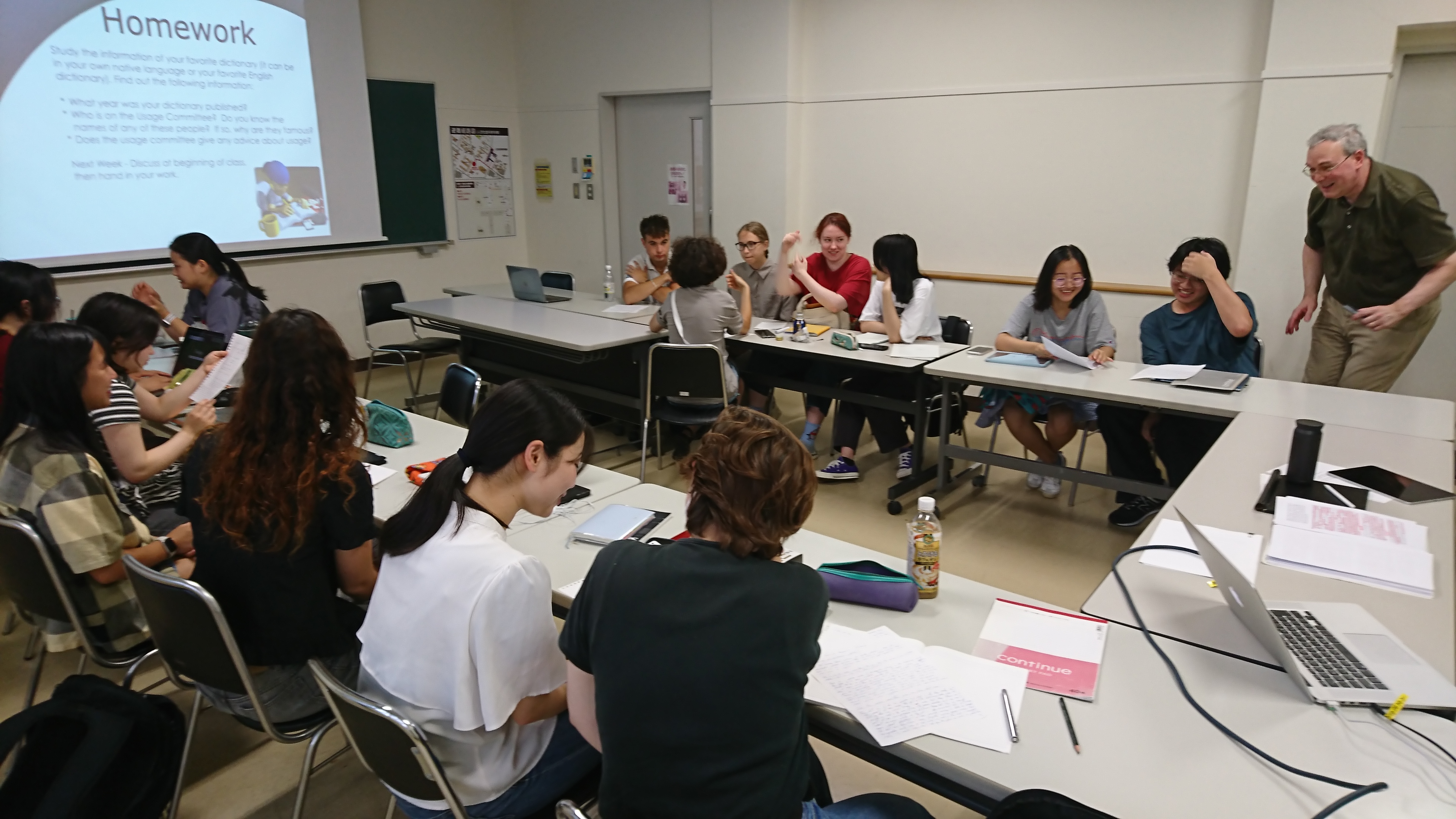英語学の島守です。今回の「ゼミ訪問」では、言語文化学プログラムの英米言語文化分野のうち、英語圏文化論や応用言語学をを主題にするGregory Hadley(グレゴリー・ハドリー)先生のゼミを紹介します。留学生も多数参加するので、授業の雰囲気に新鮮さを感じました。英語運用能力だけでなく、英語に対して深い視点を身につけたい学生にはベストなゼミだと思います。ハドリー先生のインタビュー記事はこちら。
This article is partly written in English, so if you are a foreigner and are interested in studying in Niigata, this article will help you get a clearer picture of our university. Don’t forget to check his interview!
「英語」という言語の背後にある文化を探る
このゼミでは、英語の言葉に関する文化を探究します。英語の言葉の起源や歴史を通して、様々な語・フレーズを対象に学んでいきます。What is Language?(言語とは何か?), How New Words Are Made(新語創生の過程), The Spread of English Around the World(世界への英語の発展)など、問いを掲げながら、言語がもたらす人間・社会とのつながりを考えます。このような分野は社会言語学(sociolinguistics)と呼ばれます。

この日は、辞書の歴史と発展の講義を聞いた後、 ‘How could dictionaries better keep up with changes in the language?’(どうすれば辞書は言語の変化に対応できるのだろうか?)というQuestionに対して、学生同士が各々の辞書の使用経験を踏まえながら意見交換していました。このようなユニークな質問によって、物事をあらゆる視点から批判的に思考する(critical thinking)機会になると思います。
「英語で」専門的に学ぶ
This seminar has another interesting point, which is that you can learn sociolinguistics all in English. Read some articles before the class, listen to the lecture, discuss with classmates, and take notes in English. Although this course is not an English communication lesson, this method, English Medium Instruction (EMI), leads you to boost your English skills and dive deep into fascinating topics.
(このゼミでは、英語で社会言語学を学ぶことができるという興味深い特徴があります。英語で、授業の前に文献を読み、講義を聞き、ディスカッションをして、ノートを取ります。この科目は英語のコミュニケーションの授業ではありませんが、このEMIの手法によって、英語の技能を高め、面白いトピックを深く考えることにつながります。)
English Medium Instruction (EMI) …… The use of the English language to teach academic subjects in countries or jurisdictions where the first language (L1) of the majority of the population is not English.
(教授言語としての英語 …… 人口の大部分の第1言語(L1)が英語ではない国や地域で、英語を使って学術的な科目を教えること)
Julie Dearden ‘English as a medium of instruction – a growing global phenomenon’ British Council, 2014. Here is the link (02/08/2024). Translated into Japanese by Eddie SHIMAMORI.
There are both Japanese students, mainly in the faculty of humanities, and international students in one classroom. I asked Prof. Hadley about the about the requirements to attend this class, and he said: “A TOEIC score of 650 would be good to have for students who want to participate in the class.” Students seem to get a taste of university-style learning in a global environment.
(主に人文学部に所属する日本人の学生と留学生が1つの教室にいます。この授業に参加するために必要な条件をハドリー先生に尋ねたところ、「授業に参加したい学生は、650点のTOEICのスコアを持っていることが望ましいです」とおっしゃっていました。グローバルな環境で学生は大学の学習スタイルに触れることができそうです。)
A student says: “Hadley’s class is really fun! It’ all in English, however you do not need to worry about your English. Everyone helps you!” All students from faculties are welcome to attend, so don’t worry about the class if you have strong desire to study sociolinguistics and to interact with various students, regardless of your nationality or faculty.
(「ハドリー先生の授業はとても楽しいです。すべて英語で行われますが、自分の英語力に心配する必要はりません。みんなが助けてくれますよ!」と受講者が言ってくれました。どの学部の学生も歓迎されるので、社会言語学を学びたい、そして国籍や所属学部に関係なく様々な学生と関わりたいと強く思っていれば、ぜひ授業に参加してみてください。)

担当のGregory Hadley先生より
言葉には、それを使う人々の歴史や文化、人間の創造力、そして言語の力についての驚くべき物語があります。ハドリーゼミでは、英語の言葉の文化を探求します。私たちは、一般的な言葉や珍しい言葉やフレーズの起源を歴史を遡って追いかけ、その「ルーツ」を発見します。日常的に使われる言葉の背後に隠された物語を明らかにする、時間と言葉の冒険に出発しましょう!
受講者に訊いてみました
➤ このゼミを選択した理由をお書きください。Could you tell us what brought you to join this seminar?
- 英語だけのクラスで授業を受けたかったから。
- これから留学に行くので、英語での授業やディスカッションになれるため、参加しました。
- 英語を鍛えたいため
- As a student who major in Chinese literature in home university, I have a big interest in linguistics.
- I love dr. Hadley and wanted to take one of his classes.
- I wanted to learn more about linguistics and English is my 2nd language, so it seemed really interesting to me.
- Interest in language, recommendation that the professor is interesting
- Because I like Hadley’s class.
様々な目的を持った学生が集まっていることが伺えます。海外の大学の授業は、日本の授業スタイルと異なります。特に留学を考えている人は、その雰囲気に慣れることができると思います。留学生の中には、英語がL1ではない国から来る学生もいますので、まさにグローバルな学びを体験できます。
➤ このゼミで、どのようなことを学んでいますか?(学修の取り組み方や困難、雰囲気など)What do you study in this seminar? Please tell us anything about your seminar, like the way you learn, some difficulty or special events with your classmates.
- 言語学の興味深いトピックを学んでいる。受講する前よりも、4技能の向上が実感できている。全て英語での授業なので、特にレポートを書くための資料を読むのが大変。授業の雰囲気はとても心地よい。内容に関係なくクラスメイトと話をするのも楽しい。
- 久々に英語で勉強することができて難しいが楽しいです
- 授業の中で議論の時間が取られているので、自分から話すのが苦手な人でも議論に参加できる。話の内容は、英語の歴史に関わる内容が多く、質問もユニークなものが多いため、授業は楽しく受けることができる。英米文学の市橋先生の授業も受けているが、一般的な他のゼミと比べると課題は少なく、予習量も少ない。
- We learn many things about language – how does it work, what power it has and how does it affect our life.
- The way we learn is very informative, I find that having discussions in class helps to broaden my perspective by engaging with my classmates
- I enjoy discussing about topics with my classmates. We have a lot of backgrounds from each home country.
- We study everything surrounding the birth of words, how words are used, their meaning, their roots and how they evolve in different contexts. It’s really complete and gives a new perspective on how we use words and what importance we can give to words, what place writing, speaking, communicating has in our societies. We have a lot of occasions to talk within small groups and discuss what we think, and it’s even better considering a lot of us have different native languages and we can use our knowledge of them. English is also a lot of people’s second language, so we can talk about how learning it affected our understanding of it.
ハドリー先生の授業では、ディスカッションの時間が多く設けられています。その準備として、事前にハンドアウトを読んだり、授業後にエッセイをまとめたりします。英語をL1としない学生にとっては、決して容易ではありませんが、相対的に英語運用力の向上が感じられ、授業を楽しんでいるようです。
➤ 今後はどのようなことを学んでいきたいですか?将来の展望などもお聞かせください。What are you thinking about your future studies or career?
- イギリス文学とジェンダー論を中心に学び、卒論を書きたいと思っている。
- 写真芸術に関わる内容を研究する予定です
- 自分は英語があまりできない。言語学の授業なので、英語を勉強して、授業内で出てきた例を理解できるようになりたい。
- i would like to apply for Master Degree, but may change my major. Yes i have already decided the theme for my final project.
- Early and childhood education.
- I haven’t decided on a final project yet but I want to work in intercultural communication.
- I want to study History but I’ve always been interested in languages and linguistics. I’ve studied foreign languages before and it’s still very interesting to me. As for the equivalent of final project in France I’d like to do it on Japanese nationalism (which also ties into the Japanese language).
- I am thinking of becoming a translator
- No, at the moment I’m still undecided but i think that this sociolinguistics course will help will various future trajectories
卒論のテーマは様々です。社会言語学に関することに興味を持っている人もいれば、異文化・多文化を追求しようと考えている人もいます。国の垣根をこえた学生と学ぶからこそ、新たな発見が得られ、自分が興味あることに取り組むことができると思います。